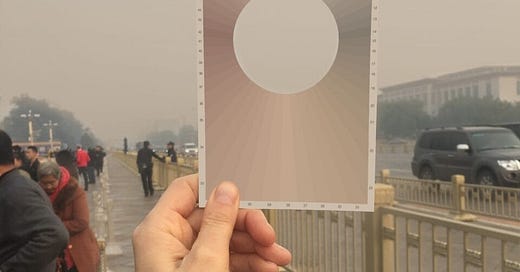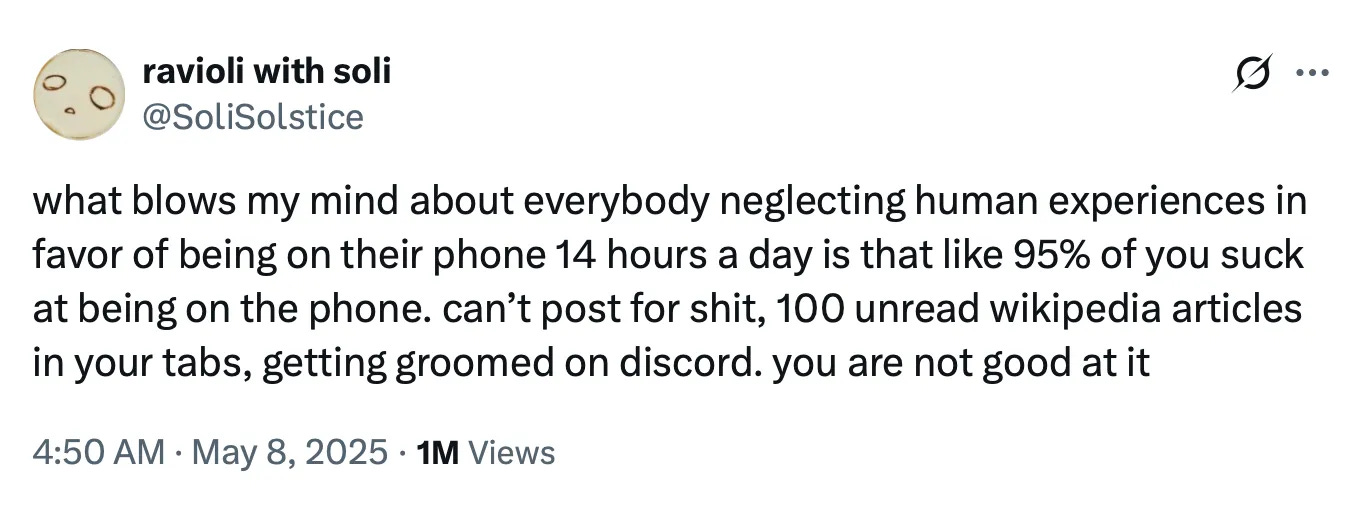Rabbit Holes 🕳️ #117
From a post-american world to architecture > implementation, the death of collecting, from independence to entanglement, family-scale technology, becoming death doulas, and air pollution postcards
Hello friends, and welcome to the 33 new subscribers who joined us since last week. Before we get into this week’s Rabbit Holes, here is a tiny little teaser of this month’s deep dive topic:
To me, this is probably the most important deep dive I’ve published yet (no pressure…😅). What I’m sharing with you this time is basically my entire philosophy and very practical toolset (or technique) for what I call ‘reframing’ – which, as you know, this newsletter is all about. After exploring (re-)framing for more than three years, I believe I have developed a really simple, handy, yet very impactful tool for making sense of the world, unlocking new ideas, and driving systems change. And I wanna share it with you!
This deep dive will come out end of next week. I’ll share a small free version for all subscribers and a bigger, much more valuable version for paid subscribers. I hope you’ll like it (very exciting…😊)!
Okay! Without any further ado, let’s get into this week’s Rabbit Holes…
THIS WEEK ↓
🖼️ Framings: The Post-American World // Architecture > Implementation // The Death of Collecting
📊 Numbers: Peak China CO²
🌀 Re-Framings: Independent → Entangled // Personal Tech → Family Tech // Becoming Death Doulas
🧬 Frameworks: Regenerative Practices For Place
🎨 Works: Love Stories // Air Pollution Postcards // Airport Short Stories Prints
⏳ Reading Time: 12 minutes🖼️ Framings
Naming Framing it! Giving something we all feel more prominence in a way that promotes a deeper reflection.
🗽 The Post-American World
The image of America is highly tied to the image of hyper-capitalism. The more hyper-capitalism fails to solve the world’s most pressing problems, the more the image of America will fail to act as a model for the world.
“America once used to believe it was a model for the world. I don’t think that was true, so much, but America believed it, anyways. And in some ways, America was at least the idea of a model for the world, even if a contested one, in the sense, it was the one we’d debate about and contest.
Those days are over now. Nobody wants to be America. End up like America. Become what America became. The idea of America as a “leader” now is finished. […]
There are strongmen, it’s true, who’ll want to emulate Trump. But I highly doubt at this point that many people would want their country to end up like America, and that is the point I’m making. […]
We are now entering a Post American World. What that means is that the world is now outgrowing America. It is outgrowing it politically: America will be surrounded by social democracies, who once used to be its friends. It’s outgrowing it intellectually: think of how much more a sophisticated vision “Mexican Humanism” is than whatever crackpot junk comes from America’s thought leaders these days. It’s outgrowing it institutionally: as truly modern transcontinental blocs like a Canada-EU alliance form, America becomes something obsolete, a relic, by comparison. […]
You see, in this world we are entering now, there is less need for America. If the world is reorienting around blocs of social democracy, then what need is there, really, for America’s hyper capitalism? Didn’t it just melt down into fascism anyways? In a world where scarce capital must flow not just to predators and lunatics, but to genuinely useful activities for humanity again—what good is American capitalism? […]
The world is now outgrowing America, and to the world of the 21st century, American hyper capitalism is going to become—is already becoming—something like an obsolete relic. Its inequalities and toxicities give way to tyrants and crackpots like Trump and to the disaffected masses which will follow him to the edge of violence and beyond. Meanwhile, it can’t solve a single real problem in the world, period, full stop, anymore, which is why America has so many of them, whether we’re talking basic resources, public goods, climate change, or just giving people decent lives, not ones of despair and rage.
And as the world goes on discovering that American capitalism is obsolete, in the way that an internal combustion engine is, or largely useless now, like a broken compass is, what happens? America’s economy, which is solely based on it, must be revalued at a much lower level.”
» The Post-American World (or Why America's Becoming Obsolete) by Umair Haque
📐 Architecture > Implementation
Although I do not agree with everything said in the piece below, I do feel and see the described shift. What I am most excited about in this context is the possibility of small, independent businesses and solopreneurs developing very custom and creative little platforms or applications. I’m excited about how AI decreasing the power of mega-corporations and enabling the rise of diversity, boutiqueness, and independence in business.
“We’re now facing a rupture, a phase transition. AI has eroded the value of specialization because, for many tasks, achieving the outcome of several years of experience now takes a $20 ChatGPT subscription.
If a decade ago it took me nine months to gain enough experience to ship a single prototype, now it takes just one week to build a state-of-the-art platform ready to be shipped — a project once only achievable by a full team of professionals. […]
The game has shifted, and the winning strategy with it. It’s no longer about understanding specialized details; it’s about grasping the high-level global picture. It’s less about knowing how to patch a system and more about knowing that it needs to be patched. It’s more about architecture, and less about implementation. Precisely where generalists thrive.
For these individuals, boundaries between professions are beginning to blur and overlap. I’ve begun to see product managers developing business financial models; designers writing commercial ads; barbershops building custom booking systems; and restaurant owners creating advanced pricing tools. Even domains seemingly far from tech, like agriculture, are beginning to see this impact, with farmers building crop tracking systems. These people always had it in them to do these things. The key difference is that it no longer takes years to learn how.
If you extend this argument to the limit, you end up with individuals running entire companies by themselves. The share of solo-founder startups has almost doubled in the last few years, and the first examples of businesses with a handful of employees generating hundreds of millions of dollars in revenue have emerged. […]
The transition will take time, and it will be far from painless. Institutions built around credentials won’t go gently into the good night. Middle management will fight to keep headcount because it will take time to shift away from the idea that more people working on a problem signals a more important problem. Schools and colleges will take a while to adapt their teaching methods and content. Only bottom-up market competition will force change.”
» Agency Is Eating The World by Gian Segato
💽 The Death of Collecting
This piece is quite profound and connects to many topics we’ve highlighted here before: the flattening of culture, the loss of agency, sur- or hyperreality, and convenient tech leading to alienation and disembodiment. On top of that, it’s such a relatable experience.
“I opened the Spotify app on my laptop a few weeks ago and found that everything I had saved was in disarray. The albums weren’t where I thought they were. I couldn’t flip through them with my usual clicks, the kind of subconscious muscle memory that builds up when you use a piece of software every day, like your thumb going directly to the Instagram app button on your phone screen. Spotify had updated its interface and suddenly I was lost. […]
Even if the change in the interface was minor — requiring an extra click to get to my playlists or moving the link to my saved albums — it’s a reminder that I don’t actually own any of what I’m listening to. I’m just paying for access month by month with my subscription fee to the streaming service. My relationship to music is ultimately dictated by the Spotify platform, both what I can listen to and how I listen to it. […]
My lostness comes from the sense that our cultural collections are not wholly our own anymore. In the era of algorithmic feeds, it’s as if the bookshelves have started changing shape on their own in real time, shuffling some material to the front and downplaying the rest like a sleight-of-hand magician trying to make you pick a specific card — even as they let you believe it’s your own choice. And this lack of agency is undermining our connections to the culture that we love. […]
As I’ve used Spotify longer and the interface has changed shape, I’ve found myself becoming a more passive user, saving fewer albums; thinking less about the specifics of the albums or artists I’m hearing; and losing track of my library. What’s worse for me as a collector and cultural consumer is ultimately better for the platform: I’ll keep subscribing to Spotify because it’s the only way I’ll have access to the music. There’s no CD binder I can take with me. […]
Just as collections require permanence, they also need individuals, whose voices and tastes they express. The mass of Spotify isn’t actually a collection; it’s an avalanche.”
» The digital death of collecting by
📈 Numbers
A thought-provoking chart that perfectly captures a pivotal shift:
📉 Peak China CO²
“For the first time, the growth in China’s clean power generation has caused the nation’s carbon dioxide (CO2) emissions to fall despite rapid power demand growth.”
Below the paywall: 3 thought-provoking re-framings, 1 handy framework, and 3 inspiring examples that help you reimagine and build systems that feel more alive. Used weekly by 100+ creatives, strategists, and system-shapers – aka my paid subscribers.








